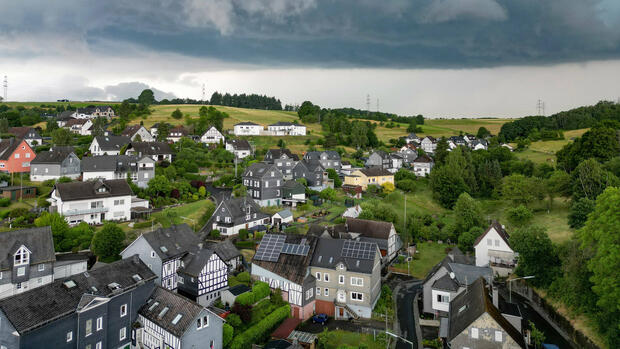Rural communities were concerned that important projects would be left behind.
(Photo: IMAGO/Rene Traut)
Berlin According to Handelsblatt information, the federal government has agreed on a less severe cut in funding for rural areas. Finance Minister Christian Lindner (FDP) had proposed reducing the programs “Joint Task for the Improvement of Agricultural Structures and Coastal Protection” (GAK) and “Joint Task for the Improvement of the Regional Economic Structure” (GRW) in the coming year by 300 million euros each. The GAK is the responsibility of Agriculture Minister Cem Özdemir (Greens), the GRW in that of Economics Minister Robert Habeck (Greens).
A spokesman for the Ministry of Agriculture explained when asked by the Handelsblatt: “The flat-rate savings target of the Federal Ministry of Finance, specifically related to the GAK, of at least 300 million euros has now melted down to 150 million euros.”
In addition, the remaining reduction no longer necessarily has to be achieved in the GAK, according to the agreement with Lindner’s house. Overall, the Ministry of Agriculture will now save 339 million euros instead of 489 million euros.
According to Handelsblatt information, the reduced reduction in the GRW is of a similar magnitude to that in the GAK. “In the tough budget negotiations, we were able to prevent the GRW from being cut short,” said Minister Habeck. It is important that massive cuts that damage the economy or rural areas are avoided.
In both programs, the federal states top up the federal funds by a similarly high contribution. Lindner’s planned reduction would have meant a loss of around 600 million euros each. For comparison: the federal government made 650 million euros available to the states for the GRW in the current year, and 1.1 billion euros for the GAK.
No massive cuts in regional economic development, coastal protection and agricultural funding.
(Photo: Imago Images)
The cuts are part of the traffic light government’s fundamental dispute over the federal budget for the coming year. Overall, however, the negotiations are now “on a very good path,” said Habeck’s environment.
Countries resist cuts
Rural areas in particular benefit from the GRW and GAK programmes. The cutback plans had triggered a wave of protests – not only from the Green Federal Ministers but also from the federal states. It was feared that a cut here could drive more voters into the arms of the AfD. The far-right party is currently at the poll high.
With Daniela Schmitt, the Economics Minister from Rhineland-Palatinate, there was cautious criticism even from the FDP. She is “confident that the federal government will attach particular importance to the development of rural areas,” she said.
>> Read here: Countries are up in arms against plans to cut economic development
The state ministers from the SPD were even clearer. Brandenburg’s Economics Minister Jörg Steinbach had explained in the Handelsblatt that every cent less in the programs for the regions would have “dramatic consequences”. Hamburg’s finance senator Andreas Dressel warned: “That would deal another blow to the acceptance of German politics in difficult times.”
It is particularly piquant that the criticism from the countries comes from social democrats in particular. Lindner had officially announced the cutback plans in his capacity as finance minister. But it was Chancellor Olaf Scholz who was driving the plan significantly, according to government circles at the time.
Savings are returns for Scholz
For Scholz, this is supposedly the return for refugee financing. At the end of May, the federal government gave in to the demands of the federal states for more financial support for the care of refugees.
For this year, the refugee lump sum that the federal government makes available to the federal states has been increased by one billion euros. According to government circles, the chancellor now wanted to get as much of it back as possible through regional economic development. Apparently, however, the resistance was too great.
More: Habeck removes chip manufacturer with Chinese owner from funding list
